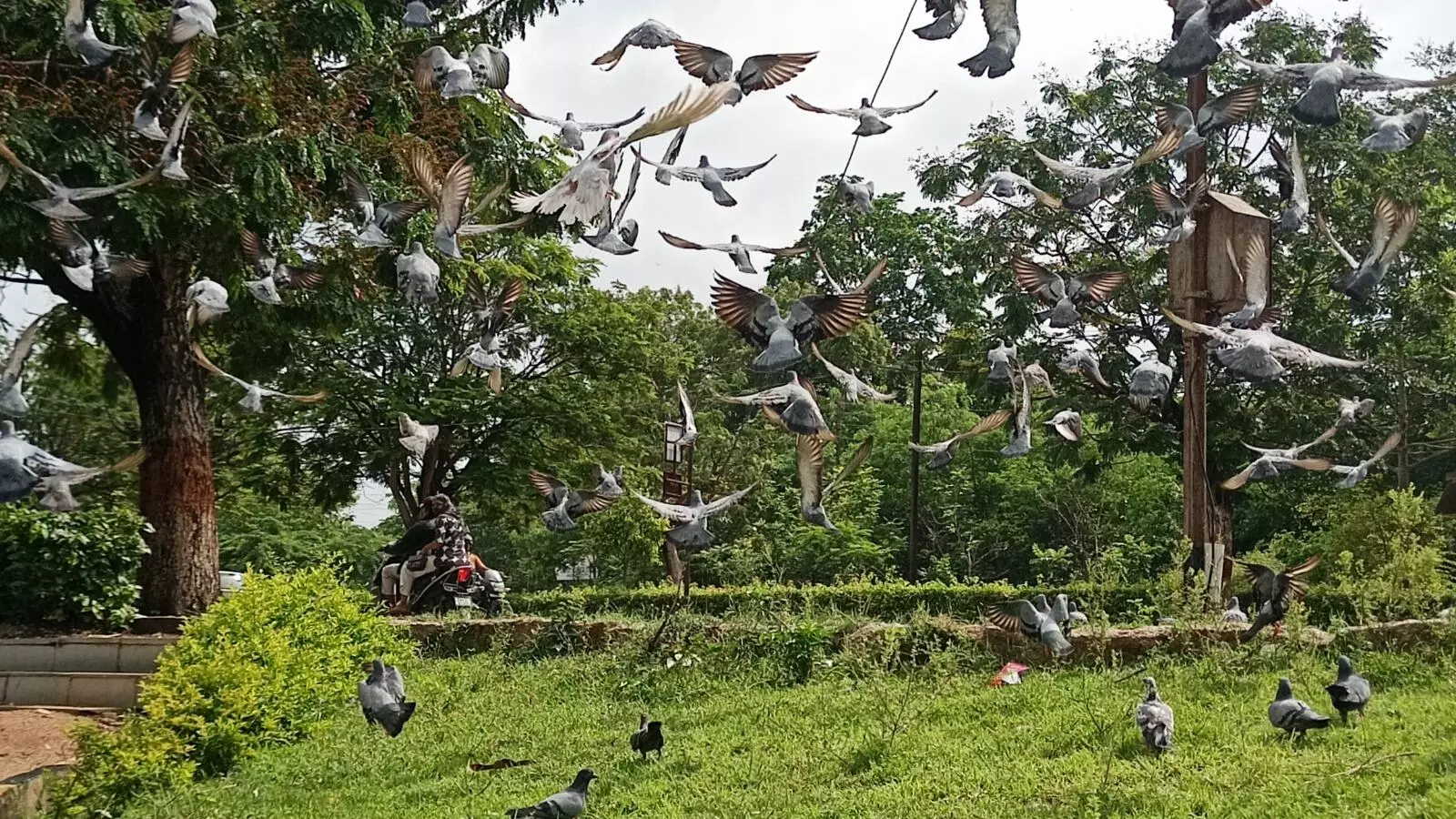Hyderabad residents urged to stop feeding pigeons amid health risk concerns
The biggest problem with the overpopulation of pigeons is that their droppings affect people’s health, say Hyderabad residents
By Kedar Nadella
Hyderabad: A large flock of pigeons outside the OU College of Arts and Social Sciences
Hyderabad: The Municipal Corporation of Delhi is planning to ask people not to feed pigeons in public spaces. The city said the move is important to stop health issues caused by birds’ droppings.
Issues with pigeons and their populations are also a problem in Hyderabad. Many parks and public places, such as Tank Bund and Nampally, see hundreds of pigeons flocking every day. It is a common sight to see people feeding these pigeons in the mornings, many not knowing how much of a menace they have become and the health risks they pose.
“The biggest problem with the overpopulation of pigeons is that their droppings affect people’s health,” said Sabah Quadri, who runs an NGO in Hyderabad.
“Many pigeons gather at Tank Bund, where people go for a walk. A lot of people feed these birds, for religious or for any other reason, not knowing that these birds affect people’s health,” she added.
Green areas in Secunderabad see pigeon problems
Areas such as Osmania University see a considerable number of pigeons whose population is on the rise due to a number of people feeding them.
This is also increasing the areas that are covered by pigeon droppings, leading to respiratory problems. They are also making places uninhabitable because of the smell and how hard it is to get rid of them.
“From sweepers who clean the university streets to students studying and living inside OU buildings, many people are at high risk of getting infected by diseases carried through pigeon droppings,” said Dr Venkat, a contract employee of the OU Library.
Dr Venkat is also a rock artist and has been drawing pictures on rocks to raise awareness among the public about not feeding pigeons at OU. Bird lovers can feed the pigeons inside forest areas where they won’t be a problem for humans, but the exact opposite is happening here, said Dr Venkat.
Residential areas are also not safe from pigeons
Many residential communities have put nets on their flats, hoping that the pigeons won’t affect them. However, those measures have not been enough to ward them away.
Pigeons have also become a bane for other birds.
“We put out some grains to attract other birds. But pigeons hijack those feeding areas and don’t let other birds come. They hijack the food meant for other birds,” said Sabah.
Sabah said the way to stop this problem is for the police should impose a fine on people feeding pigeons indiscriminately, just like how it is done in Mumbai and other cities.
Dr Venkat said that OU has instated a security person, especially for telling people in the mornings not to feed the pigeons. There are many signboards outside buildings, too, warning people about the dangers of feeding pigeons.
How pigeon droppings bring health issues
The pigeon droppings can cause irritation and inflammation of the lungs and even lead to permanent damage to the organs.
Medical experts stated that prolonged exposure to pigeon-infested environments, especially bird droppings, can lead to infections from various types of harmful fungi, bacteria and parasites.
As the droppings dry up, they get airborne as dust, enter the human body while inhaling, reach the lungs and can cause hypersensitivity pneumonitis, which can be fatal under certain conditions.
These infections are worse than getting allergies from the fur of pet dogs and cats and feathers from pet birds.
Signs of infection from pigeon droppings
In the initial stages of a persistent dry cough, antibiotics and bronchodilators are used, but if the cough persists for more than two to three weeks and doesn’t get relieved with antibiotics, then one must visit a pulmonologist for further tests.
Without proper treatment, patients develop chronic coughs and become dependent on external oxygen supply and nebulisers, which don’t make the condition better and eventually, the lungs fail, requiring a transplant, which may or may not be successful.
Therefore, advanced tests are recommended, such as a high-resolution CT scan, Lung Function Test or Blood Test for Serum IG (E), Hypersensitivity pneumonitis panel/antigen test, etc. Through these tests, the changes in the lungs and hypersensitivity pneumonitis can be detected, if present.